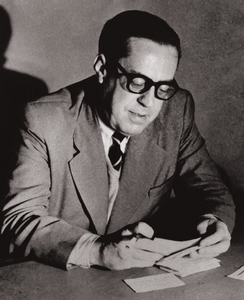Sérgio Buarque de Holanda (1902-1982)

A great historian whom I first met in the United States and frequently thereafter in Brazil.
The first occasion was when he was visiting Boston and I was on an initial Brazilianist stint at Harvard. He wanted to meet some faculty, so I arranged an evening with myself and Stan Katz, who was a fellow junior historian at Harvard. The fourth companion was a full bottle of Scotch, a beverage with which Sérgio was reputed to be quite familiar.
Sérgio’s dossier (these documents always lie) said he was fluent in spoken English. Alas, this was hardly the case. My Portuguese was still rudimentary and Stan’s was nonexistent. Sérgio’s speech at the best of times was frightfully difficult to pick up. What with the excellent whiskey and all, we were left in a bit of a muddle. Afterward I assured Stan that he had been in the presence of one of Sérgio’s more practical practitioners. As a good friend he believed me.
In Brazil I saw Sérgio often, usually at his comfortable home on Rua Buri in São Paulo. His study was a gathering place for historians all over Brazil. By this time I had gotten better at understanding his speech, but it was still a challenge because he loved to tell Brazilian jokes, using local slang.
As a young man he had spent some years in Europe. There he partook of the Modernist culture, which he later incorporated into his own work.
He was known in Brazil and abroad for his beautifully crafted book, Raízes do Brasil. It was an elegantly written exploration of Brazil’s European and internal origins. He was known for his many history works, especially the multi-volume History of Brazil. From his university chair at the University of São Paulo he trained many of the following generation of Brazilian history. He was wonderfully conversant with Brazilian historiography and I learned much from him on this.
While I was living in Brazil Sérgio was overshadowed by one of his sons, Chico Buarque de Holanda, who would become a world-renowned singer, linguist, and poet. This all came back to me when I was visiting a university in the interior to which Sérgio had donated a part of his library after he retired. I was taken to visit the university library, where the curator proudly showed me a display case with the copy of my book I gave Sérgio with the dedication, “When I came to Brazil you were Sérgio, now you’re the father of Chico, Abraço Tom.”
To see that displayed in the hinterland was quite a delight.
Sérgio, like Antonio Candido, was a liberal academic against the dictatorship. The latter forced him out of his professorship, which he had hoped later to pass on to Caio Prado Junior. We discussed that at length. Unfortunately there wasn’t time to work it out. But he did manage to be one of the founders of O Partido dos Trabalhadores. One of the distinguished liberals of the old school who managed the shift.
My friend and colleague helped to get Lula on his way.
Further Readings
Holanda, Sérgio Buarque. Cobra de vidro. São Paulo: Editora Perspectiva, 1978.
Holanda, Sérgio Buarque. Capítulos de literatura colonial. 1st ed. São Paulo, SP: Editora Brasiliense, 1991.
Holanda, Sérgio Buarque. Roots of Brazil. Translated by G. Harvey Summ. Notre Dame, Ind.: University of Notre Dame Press, 2012.
Sérgio Buarque de Holanda was born in the city of São Paulo. Beginning in 1929, he worked as a journalist for Jornal do Brasil, acting as correspondent in Berlin. In 1936, he published Raízes do Brasil [Roots of Brazil], an influential study focused on the history of Brazilian culture. In 1958, he was the Chair for the History of Brazilian Civilization at the University of São Paulo. During the same year, he received the Edgar Cavalheiro Award from the National Book Institute for his publication of Caminhos e fronteiras [Paths and Frontiers]. In 1962, he served as president of the Institute of Brazilian Studies at the University of São Paulo. From 1963 to 1967, he taught as a visiting professor at many universities in Chile and the United States. He also participated in the United Nations Educational, Scientific, and Cultural Organization (UNESCO). Throughout the years, he published many works, including Vale do Paraíba - Velhas Fazendas [Paríaba Valley—Old Farm Plantations] (1975) and Tentativas de Mitologia [Mythological Attempts] (1979).

